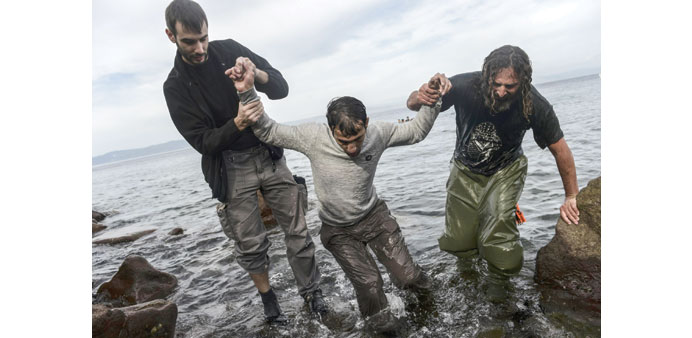A man is rescued by Greek people as he arrives on the Greek island of Lesbos after crossing the Aegean Sea from Turkey.
Agencies
Geneva
About 1,000 migrants are stuck at the main border crossing into Macedonia from Greece, denied entry due to their nationalities in contravention of international law, the United Nations said.
But there were signs yesterday that an unrelenting tide of refugees into Europe was starting to ebb, although humanitarian officials said it was too early to declare a trend.
The number of refugees and migrants reaching the Greek islands, the most frequently used entry point to Europe, fell to 155 on Sunday while 478 arrived at the ports of Athens and Kavala - far fewer than the daily average for the past few months, the International Organization for Migration said.
There had also been no migrant boats landing in Italy, the other main route into the EU, since November 19, it said. The UN said it remained unclear whether the drop-off in arrivals would continue but an IOM official called it “significant”.
It was not immediately known what factors lay behind the sudden decline in incoming migrants.
Increasingly stormy winter weather is making crossings by sea from Turkey dangerous. Traditional refugee haven Sweden has also tightened asylum rules while a popular backlash against refugees is growing in their most favoured destination, Germany.
Macedonia’s refusal to admit 1,000 migrants was part of a new clampdown by Balkan states on the main corridor trekked by refugees bound for wealthy western Europe, coinciding with growing security fears after the November 13 attacks in Paris.
The UN refugee agency said new, uncoordinated restrictions that have stranded migrants on several frontiers in the Balkans threatened a “new humanitarian situation” that required urgent attention given the onset of freezing winter weather.
“The new restrictions chiefly involve people being profiled on the basis of their claimed nationalities,” UNHCR spokesman Adrian Edwards told a news briefing in Geneva.
At the borders between Greece and the ex-Yugoslav republic of Macedonia, and between Macedonia and Serbia, nationals of Syria, Afghanistan and Iraq are being allowed to cross.
Nationals of other countries are being stopped, leading to protests by about 200 people, mainly Iranians, Bangladeshis and Pakistanis, with some 60 on hunger strike, Edwards said.
“All people have the right to seek asylum, irrespective of their nationality and to have their individual cases heard. Proper information needs to be provided to people affected by decisions at border points, and proper counselling needs to be available,” he said.
About 30 people are marooned at Macedonia’s northern border with Serbia, mostly Nigerians and Moroccans, UNHCR spokesman William Spindler told Reuters.
On Monday, 409 people arrived on Greek islands near Turkey that are already sheltering 2,245 people, Spindler said.
“But it’s too early to say whether it (arrivals) will continue to go down or pick up again. Apparently there were a number of boats arriving on the islands last night.”
But an IOM statement said: “The drop is significant given that, according to IOM estimates, some 100,000 migrants have crossed into Greece since the beginning of November - averaging around 4,500 crossings per day.”
There have been no migrant deaths reported in Greek-Turkish waters since November 17, “so we’re hoping this is showing a trend where things are starting to fall off with the winter,” IOM spokesman Joel Millman said.
“There has been no landing in Italy since the 19th of November. We don’t believe that this many days have gone by without an arrival in almost two years, so that’s kind of significant.”
Millman also cautioned against jumping to conclusions. He cited Turkish Coast Guard exercises as another possible reason for the sharp drop in migrants leaving the country for Greece. “Although we do note a sharp decrease, we’re wondering if it’s going to start ticking up again,” he said.
Only 148 refugees have been relocated from Italy and Greece to other European Union countries -- Finland, Luxembourg and Sweden - under a plan for transferring 160,000, agreed by EU leaders in September, Edwards said.
“The situation is untenable,” Swedish Prime Minister Stefan Lofven told a news conference. “Now, to put it bluntly, more people will have to seek asylum and get protection in other European countries.”
Vice premier Asa Romson of the Green Party was close to tears at the news conference as she announced the tougher measures.
Lofven said the new rules would be in force for three years and that Sweden’s asylum system needed “breathing space”.
Around 80,000 asylum seekers have arrived in Sweden over the last two months and the Migration Agency said earlier in November it could no longer guarantee accomodation for all.
Some asylum seekers have been forced to sleep rough just as the freezing Swedish winter begins to bite.
“It is clear that migration politics in the EU need to be completely reviewed,” Lofven said.
Until the current crisis, all those granted asylum have been given permanent residency. The government introduced temporary asylum earlier this month, but gave exceptions to children and families.
Now only asylum seekers coming to Sweden under international quota agreements will be given permanent asylum after the new rules are introduced, probably in April next year.
In addition, the country will introduce ID checks on all public transport into the country from the continent and tighten rules for family reunion.

